 Autumn, it seems to me, is a good time for fairy tales. With the nights getting longer, we gather round the hearth, or nestle by a little one’s bedside, and spin yarns to drive the dark away. Today’s selection comes out of that fine tradition.
Autumn, it seems to me, is a good time for fairy tales. With the nights getting longer, we gather round the hearth, or nestle by a little one’s bedside, and spin yarns to drive the dark away. Today’s selection comes out of that fine tradition.
The 1964 film The 7 Faces of Dr. Lao is, in many ways, a perfect fairy tale — and, in some ways, not. We’ll get to that later. The film had a terrific pedigree, anyway; based on a beloved fantasy novel of the 1930s, it was adapted by Charles Beaumont, a veteran of The Twilight Zone and screenwriter for several of AIP’s series of ”Poe pictures.” George Pal, who had produced or directed sci-fi classics like Destination Moon, The War of the Worlds, and The Time Machine, was in charge of the production. The film won a special Oscar for make-up — those seven faces, don’cha know. All this, plus a powerhouse lead performance from Tony Randall!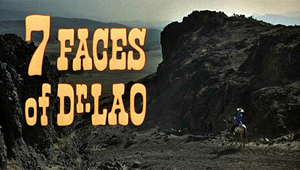
…Oh.
(Yeah, we’ll get back to that.)
The story is set in the isolated town of Abalone, Arizona, sometime around 1902. An elderly Chinese man appears in town, seemingly materializing from the very desert. His first stop is the office of Ed Cunningham, editor of the local newspaper. The old man introduces himself as Dr. Lao, and purchases an ad announcing the performance of his traveling circus — a spectacular event, he proclaims, which will feature appearances from magical creatures and figures of myth and legend. Cunningham, naturally, thinks the old fellow is cracked — he hasn’t even got a wagon, just a flea-bitten jackass — but his coin is good.
Anyway, Cunningham has troubles of his own. He’s hopelessly in love with librarian Angela Benedict, a pretty young widow; but since her husband’s death she has frozen emotionally, unable to open up even to her young son Mike. If that weren’t enough, the oily wheeler-dealer Clinton Stark is ready to buy the town right up from under its citizens. Stark has inside knowledge that the railroad will soon be coming through Abalone, and tries to scare the townsfolk into selling him their land by spreading tales that the town’s water supply will soon become inaccessible.
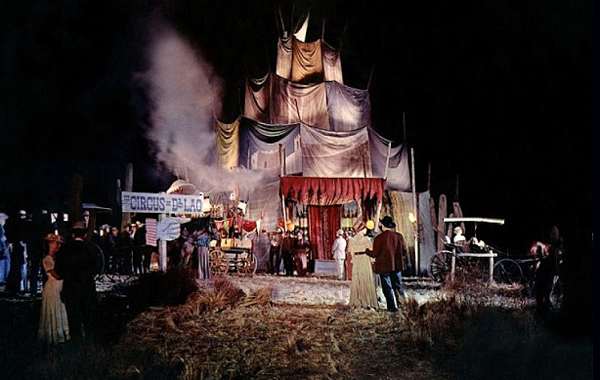
The mayor, who is firmly in Stark’s pocket, calls a town meeting to discuss Stark’s proposal. Cunningham and Angela argue in favor of saving the town — and with it, the local Navajo community, who depend on trade with Abalone for their livelihood — but most of their fellow citizens are ready to sell, intoxicated by the temptation of a short-term cash grab. Stark eventually agrees to a two-day cooling-off period, after which he will force a vote on the matter.
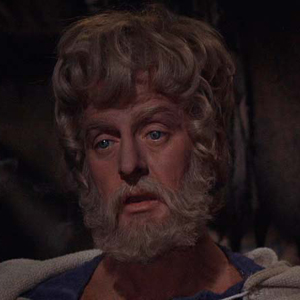 The next morning, circus tents have miraculously sprung up on the edge of town, and Dr. Lao is back on the street hanging posters to advertise his show. The old man strikes up a friendship with young Mike, who has become withdrawn and lonely since his father’s death and his mother’s emotional shutdown. Cunningham and Mike try to coax some information out of Lao, but he keeps up an air of mystery, intimating that he may be hundreds, even thousands of years old. In curiosity, Mike and Cunningham — along with all the other townsfolk — show up for the opening night of Dr. Lao’s circus.
The next morning, circus tents have miraculously sprung up on the edge of town, and Dr. Lao is back on the street hanging posters to advertise his show. The old man strikes up a friendship with young Mike, who has become withdrawn and lonely since his father’s death and his mother’s emotional shutdown. Cunningham and Mike try to coax some information out of Lao, but he keeps up an air of mystery, intimating that he may be hundreds, even thousands of years old. In curiosity, Mike and Cunningham — along with all the other townsfolk — show up for the opening night of Dr. Lao’s circus.
As the townspeople wander the circus midway, they encounter fabulous characters of myth. A self-deluding old maid has her fortune read by the blind seer Apollonius of Tyana — whose curse compels him to always tell the unvarnished truth — and he brutally exposes the meaningless emptiness of her existence. Stark, in the meantime, encounters the Great Serpent, who bears a disconcerting resemblance to himself, and who sees through the shell of cynical toughness to lay bare Stark’s bitter disappointment with human nature. Other encounters are less disturbing, though no less transformative; Angela again opens her heart to love and life after hearing the pipes of Pan. But the evening nearly ends in disaster; the unpleasant Mrs. Lindquist is turned to stone by the gaze of the gorgon Medusa, and several patrons are terrified by the Abominable Snowman. In the end, most of the townspeople flee, but the magician Merlin — now a doddering old man — is able to set things right with his magic.
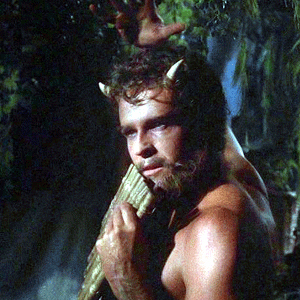
When the townsfolk return the next night, Dr. Lao treats them to a multimedia extravaganza — a magic lantern show telling the story of a mythical city called Woldercan, whose people are tempted by a mysterious trickster, and which falls to apocalyptic ruin as a result. As the house lights come up, the people of Abalone find themselves in their own town hall, about to put Stark’s buyout proposal to a vote. When the plan is voted down — when the townspeople refuse to act based on fear and greed — Stark’s faith in humanity is restored. Reformed by his experience, he reveals the truth, and the townspeople rejoice.
But Stark’s thuggish henchmen are unimpressed with their boss’ change of heart. As a dust storm blows in, they lay out for Dr. Lao’s encampment with violence on their minds… and end up unleashing a monster that even the Doctor’s magic may not be able to contain.
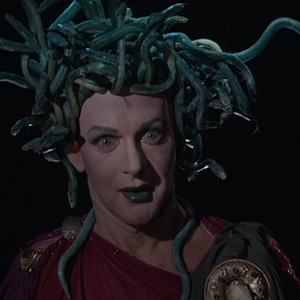
I’m not gonna lie: 7 Faces of Dr. Lao is a weird little movie. The tone is all over the place, and it’s got the bland backlot staginess of one of the Technicolor musicals it keeps threatening to become. (Imagine the cast of The Music Man invading Oklahoma.) But I still have a creeping fondness for it. It’s got heart, is what it has, and its riffing on the theme of masks — masks that conceal, masks that reveal, the masks that we wear for the outside world and the masks that hide us from ourselves — is unexpectedly rich and clever. There are worse ways to spend an hour-and-a-half, I’m saying.
But good luck seeing it. Warner gave 7 Faces a cheapjack no-frills DVD release in 2011, but it appears to be out of print already. You’re not going to find it at your video store. My local public library had it on the shelf, not long ago, and I can still find it in the electronic catalog. But when I try to reserve it on an interlibrary loan, an error message comes up: THIS ITEM IS NOT AVAILABLE. It’s not hard to figure out what’s going on; 7 Faces of Dr. Lao is being disappeared.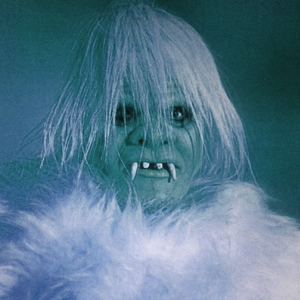
There’s no grand conspiracy at work here, no coordinated effort to suppress the film; just a lot of individual decisions by individual stakeholders, individual determinations that this movie is a holdover from a less-enlightened time, adding up to a benign neglect that lets demand languish until it finally ceases altogether. It happens, now and then, especially with children’s’ movies. Distributors take a look at their inventories and see an item that is suffused, even unintentionally, with a certain ugliness of spirit, and they let it go; they let it gently vanish. Disney has done it already, with Song of the South, and they seem to be doing it now with Peter Pan. First the movie’s legacy is de-emphasized, and then it slips out of the canon of classics, and then Time is allowed to do its work, and the film is allowed to fade into obscurity, until all that remains are fragments of songs and the few images that can be salvaged. (Disney’s Tinkerbell is more popular than ever; she stars in her own movies now, with no Pan in sight.)
I’m not here to defend 7 Faces of Dr. Lao, not really; I’m not going to claim that it’s some kind of timeless masterpiece that must be protected from small-minded critics, or that its artistic virtues excuse its cultural insensitivity. That’s not the case, I’m afraid. Tony Randall in yellowface is pretty damned embarrassing, frankly, and the first ten minutes or so, with Dr. Lao spouting singsong no-tickee-no-shirtee pidgin Eng-a-rrrrish, are some rough sledding.
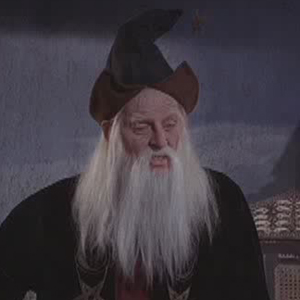
But the movie is smarter than that. Later we hear Dr. Lao turn on a dime to a perfectly fluent, nigh-Shakespearean baritone; it’s plain that his stereotypical ah-so-velly-solly persona is an act. There’s a racist joke here, all right, but Dr. Lao is the one playing it — and the joke is on anyone who underestimates him. In a way, Dr. Lao’s Asian identification is another of the film’s masks; whoever or whatever this being ”really” is, it’s virtually certain that he is not a little old Chinese man.
None of this really mitigates the retrograde and offensive practice of casting a Caucasian actor in a role that’s specifically coded as Asian, of course; but to dismiss the film outright is to dismiss its odd, whimsical style and its celebration of childlike wonder. Let’s take from it what we can, and leave the bad stuff behind. After all, even the infamous Song of the South gave us ”Zip-a-dee Doo Dah.” Surely we can salvage from 7 Faces of Dr. Lao at least one bit of wisdom: ”The whole world is a circus if you look at it the right way. Every time you pick up a handful of dust, and see not the dust, but a mystery, a marvel, there in your hand — every time you stop and think, I’m alive, and being alive is fantastic! Every time such a thing happens, you are part of the Circus of Dr. Lao.”
7 Faces of Dr. Lao (1:21:57)
PLAYLIST
Conceptual Theater intro bumper
Buffalo Ballet — John Cale
Training Horses on the Mongolian Steppe (excerpt) — The Guo Brothers
Widow’s Walk — Suzanne Vega
If I Possessed A Printing Press — George Hamilton IV
Bad Businessman (live) — Squirrel Nut Zippers
Indian Joe — Grizzly Family
Big Nothing (edit) (from Straight to Hell) — The MacManus Gang
Life Is A Carnival — The Band
A Blind Step Away — French Frith Kaiser Thompson
Reptile — The Church
The Gorgon — Angel Witch
Snowman — Muna Zul
Yeti: What Are You? — Snakefinger
Wizardry (demo) — The Who
Hymn To Pan — Faun
Galloping Over the Vast Grasslands (excerpt) — Anna Guo
Carnaval Toda la Vida (edit) — Los Fabulosos Cadillacs
The Magic Lantern — Pothead
Temptation — Tom Waits
Oh Heavenly Salvation (from Mahagonny Songspiel) — The Persuasions
Sandstorm — Peter Gabriel
Monster (Rock Mix) — The Automatic Automatic
Mother And Son (excerpt) — Trisan
Clowns — An Emotional Fish
Conceptual Theater outro bumper
Zack will be in this space two weeks from now, doubtless with something highbrow and tasteful. Me, I’ll be back in October — just in time for Hallowe’en, in fact — when we’ll take another trip to the carnival, yes indeed, but it’s not going to be anywhere near as sweet and life-affirming as the circus of Dr. Lao. By the pricking of my thumbs, I should say not. Until then, keep your ears open, and don’t believe everything you see.





Comments